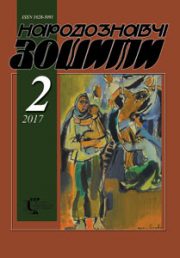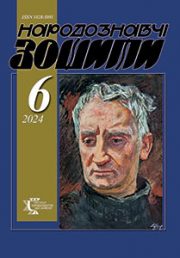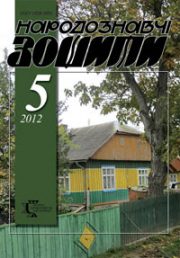The Ethnology Notebooks. 2019, № 5 (149), 1246—1259
UDK 801.8:398.8](=161.2=162.1)”18/20″
DOI https://doi.org/10.15407/nz2019.05.1246
«HEY, SOKOLY!» («HEY, SOKOЈY!»): LYRICS AND CONTEXTS OF THE SONG
KHARCHYSHYN Olga
ORCID ID: https://orcid.org/0000-0002-9379-8300
Candidate of Philological Sciences (Ph. D. in philology),
Senior Researcher at the Ethnology Institute
of National Academy of Sciences of Ukraine,
15, Svobody Avenue, 79000, Lviv, Ukraine
е-mail: okharchyshyn@gmail.com
Abstract. From the folklore point of view, the lyrics and peculiarities of the «Hey, sokoly!» song, popular among Poles and Ukrainians, have been analyzed. Its heterogeneous texture of texts, which contains components of different poetic quality and attests to the contaminated nature of the work, has been traced. It uses the motif of a Polish song from the nineteenth century «Zhal za Ukrayinow» («Sorry for Ukraine»), which is complemented with a new beginning and a chorus. Attention is drawn to poetics and symbolism in different parts of the text, with an emphasis on unconventional features marked by the influences of modern times. The information about the first occurrences of the song in the second half of the twentieth century is revealed. The content of «Hey, sokoіy!» has been rethought, has gained patriotic sound from Poles and Ukrainians. Ukrainian versions of the song are translations from the Polish language of the 21st century. This song has a patriotic sense for Ukrainians and often symbolizes the Ukrainian-Polish neighborhood.
The source base of the research is printed publications, including digital ones, available on the Internet, and the materials of the author’s own field research conducted in 2018–2019. Its topicality due to the great attention of artists, scientists and the general public to the «Hey, sokoly!» song, which is appreciated not only as a work of art but also as a manifestation of a certain ideology. The folkloristic study of this song is important due to the mass circulation in the media and even in the scientific works of the unsubstantiated version of its authorship by Tymosh Padura. The object of the study is the «Hey, sokoly!» song; the subject of the study is its Polish and Ukrainian lyrics, information about their existence in the context of two neighbouring ethnic cultures. The aim is to analyze the Polish lyrics of the song «Hey, sokoly!», to determine its folk and literary basis, to raise questions about the genesis of the song. The principles of complex folklore research developed by I. Franko, M. Drahomanov, M. Sumtsov, M. Hrushevskyy, K. Hrushevska, P. Lintur, H. Nudha and other scientists are used in the article.
Keywords: «Hey, sokoly!», song, lyrics, variant, occurrence, popularity, meaning.
Received 20.10.2019
REFERENCES
«Hey, sokoly!» Wikipedia. Retrieved from: https://pl.wikipedia.org/wiki/Hej,_soko%C5%82y (Last accessed: 9.09.2019). [in Polish].
Tomasz Padura. Wikipedia. Retrieved from: https://pl.wikipedia.org/wiki/Tomasz_Padura (Last accessed: 9.09.2019) [in Polish].
Tymosh Padura. Wikipedia. Retrieved from: https://uk. wikipedia.org/wiki/%D0%A2%D0%B8%D0%BC%D0%BA%D0%BE_%D0%9F%D0%B0%D0%B4%D1%83%D1%80%D0%B0 (Last accessed: 9.09.2019) [in Ukrainian].
«Hey, sokoly!» Wikipedia. Retrieved from: https://uk.wikipedia.org/wiki/%D0%93%D0%B5%D0%B9,_%D1%81%D0%BE%D0%BA%D0%BE%D0%BB%D0%B8 (Last accessed: 9.09.2019) [in Ukrainian].
Liubchenko, V. (2011). Tymko Padura. Encyclopedia of the history of Ukraine (Vol. 8). Kyiv: Naukova Dumka [in Ukrainian].
Balandina, N. (2018). Promotion of the polish-ukrainian song «Hej, Sokoly». Retrieved from: http://molodyvcheny.in.ua/files/journal/2018/9.1/2.pdf (Last accessed: 10.08.2019) [in Ukrainian].
Balandina, N. (2018). Song as a communicative phenomenon. Song lyrics in mass communication: Interpretation multiplicity. Kharkiv [in Ukrainian].
Galchak, B. & Kharchyshyn, O. (2019). Where do «sokoly» come from? Reflections on the genesis of a popular song. Retrieved from: http://uamoderna.com/md/halczak-kharchyshyn-hei-sokoly?fbclid=IwAR16xdLQZ6N4FityHEtOk2BekmybeDup5jEEB2zdDCaiIFDxupsmBMAPazU (Last accessed: 13.10.2019) [in Ukrainian].
Inglot, M. (2004). Tomash Padurra. In Polish Biographical Dictionary (Vol. 43) [in Polish].
Karaban, L. (2014). Tomasz Padura: known and un known. Problems of Slavonic studies. 63, 113–122 [in Ukrainian].
Kyrchiv, R. (2017). The history of Ukrainian folklore studies. V. 1 Preromantic and romantic folklore studies. Lviv. [in Ukrainian].
Strashewich, M. (1992) (Eds.). Our ancestors’ songs: patriotic songs. Komorow: Prometeush. № 193 [in Polish].
Maryla Rodowich. Hej Sokoly. YouTube. Retrieved from: ttps://www.google.com/search?sa=X&q=maryla+rodowicz+hej,+soko%C5% (Last accessed: 11.09.2019) [in Polish].
Hej Sokoly. Krzhyshtof Krawchyk. YouTube. Retrieved from: https://www.google.com/search?biw=1600&bih=771&ei=xA5gXfnLO6yyrgStq47ICw&q=krzysztof+krawczyk+hej+soko% (Last accessed: 11.09.2019) [in Polish].
A Small Wedding Songbook. Retrieved from: http://weselewesel.lap.pl/oWeselachBezalkoholowych.jak/malvySvpiewnikWeselny.php (Last accessed: 11.09.2019) [in Polish].
Kharchyshyn, O. (2011). Ukrainian song folklore in Lviv ethnoculture: transformational processes, intercultural borders. Lviv: Institute of Etnology National Academy of Sciences of Ukraine [in Ukrainian].
«Zhal za Ukrayinow» («Sorry for Ukraine») Retrieved from: https://polona.pl/item/zal-za-ukraina-z-piesni-narodowej-przelozony-na-fortepian-op-13,NTE0NDY5Ng/#info:metadata (Last accessed: 11.09.2019) [in Polish].
«Zhal za Ukrayinow» («Sorry for Ukraine»): the song dedicated to Wanda Pudlowska by Maciey Kamiкnskiy. Retrieved from: https://polona.pl/item/zal-za-ukraina-piosnka-przypisana-wandzie-pudlowskiej,NjkxNzAxMTA/0/#info:metadata (Last accessed: 11.09.2019) [in Polish].
«Zhal za Ukrayinow» («Sorry for Ukraine»). Retrieved from: https://staremelodie.pl/piosenka/3864/Zal_za_Ukraina (Last accessed: 11.09.2019) [in Polish].
Kuzmenko, O. (2018). Dramatik Human Existence in Ukrainian Folklore: Conceptual Forms of Expression. Lviv: Institute of Etnology National Academy of Sciences of Ukraine. [in Ukrainian].
Maksymovych, M. (1834). (Ed.). Ukrainian folk songs (Vol. 1. Book 2). Moscow [in Ukrainian].
Beresovskyy, І., Rodina, М., & Khomenko, V. (Eds.). (1961). Historical songs. Kyiv. [in Ukrainian].
«Charna Woda» (dark waters) phrase in Polish songs. Zhal za Ukrayinow (Sorry for Ukraine). Retrieved from: http://paroles.pl/song/default/search-in-song?keyword=Czarna+Woda (Last accessed: 11.09.2019) [in Polish].
Pastukh, N. (2013). Symbolism of animals in Ukrainian folklore: a cuckoo. Lviv: Institute of Etnology National Academy of Sciences of Ukraine [in Ukrainian].
Pastukh, N. (2007). Bird Symbolism and Meaning. In The Concise Encyclopedia of Ukrainian Etnology. Lviv: Institute of Etnology National Academy of Sciences of Ukraine [in Ukrainian].
Polish scout’s song book (1914). Krakow [in Polish].
Kuzmenko, O. (Ed.). (2005). Ukrainian Sich Riflemen’s songs. Lviv [in Ukrainian].
Wild fields. «Hey, sokoly!». YouTube. Retrieved from: https://www.youtube.com/watch?v=2Kxxqm7b_ys (Last accessed: 18.09.2019) [in Polish].
Let us sing. Fundamentals. Community songs. Compiled by Wieslaw Ardanowski. Retrieved from: https://docplayer.pl/4471609-1-spiewajmy-niezbednik-towarzyski-opracowal-wieslaw-ardanowski.html#show_full_text (Last accessed: 18.09.2019) [in Polish].
«Hey, sokoly!» Volyn National Choir. Ukrainian folk song. Retrieved from: https://www.youtube.com/watch?v=gJEv4CzFQUg (Last accessed: 18.09.2019) [in Ukrainian].
«Hey, Sokoly» or «Hey des tam de chorni vody» (Hey, there, in dark waters) (lyric song). Translation from Polish. Harmonized by Oleksandr Stadnyk. Retrieved from: https://homin.etnoua.info/novyny/hej-sokoly (Last accessed: 18.09.2019) [in Ukrainian].
«Hey, Sokoly» V. Verminsky and «Ukrainian Sokoly». Retrieved from: https://www.youtube.com/watch?v=ml1ao_QHiMQ&t=2s (Last accessed: 18.09.2019) [in Ukrainian].
Oleh Skrypka «Hey Sokoly» Ukrainian interpretation of the soundtrack to the film «Mezha» («Borderline») Retrieved from: https://www.youtube.com/watch?v=jCIGtPRmJmU (Last accessed: 18.09.2019) [in Ukrainian].







